University Mental Health Nursing Care Plan: Assessment & Interventions
VerifiedAdded on 2023/03/20
|12
|3341
|67
Essay
AI Summary
This assignment is a comprehensive essay focusing on mental health nursing, exploring the application of Peplau's nursing theory and philosophical approaches to patient care. The essay details the assessment of a mental health consumer's needs, the determination of an optimal philosophical approach, and the ways in which mental health nurses use themselves therapeutically during assessment, interventions, and evaluation of care. The assignment emphasizes the importance of building a therapeutic relationship, using self-awareness, and employing various therapeutic means, such as collaboration, empathy, encouragement, advocacy, instruction, and problem-solving. The essay also addresses the values and limitations of using self as a therapeutic tool, highlighting the significance of ethical considerations and the nurse's communication and understanding abilities. Overall, the assignment provides a detailed overview of mental health nursing practices and the critical role of the nurse in providing effective care and treatment.
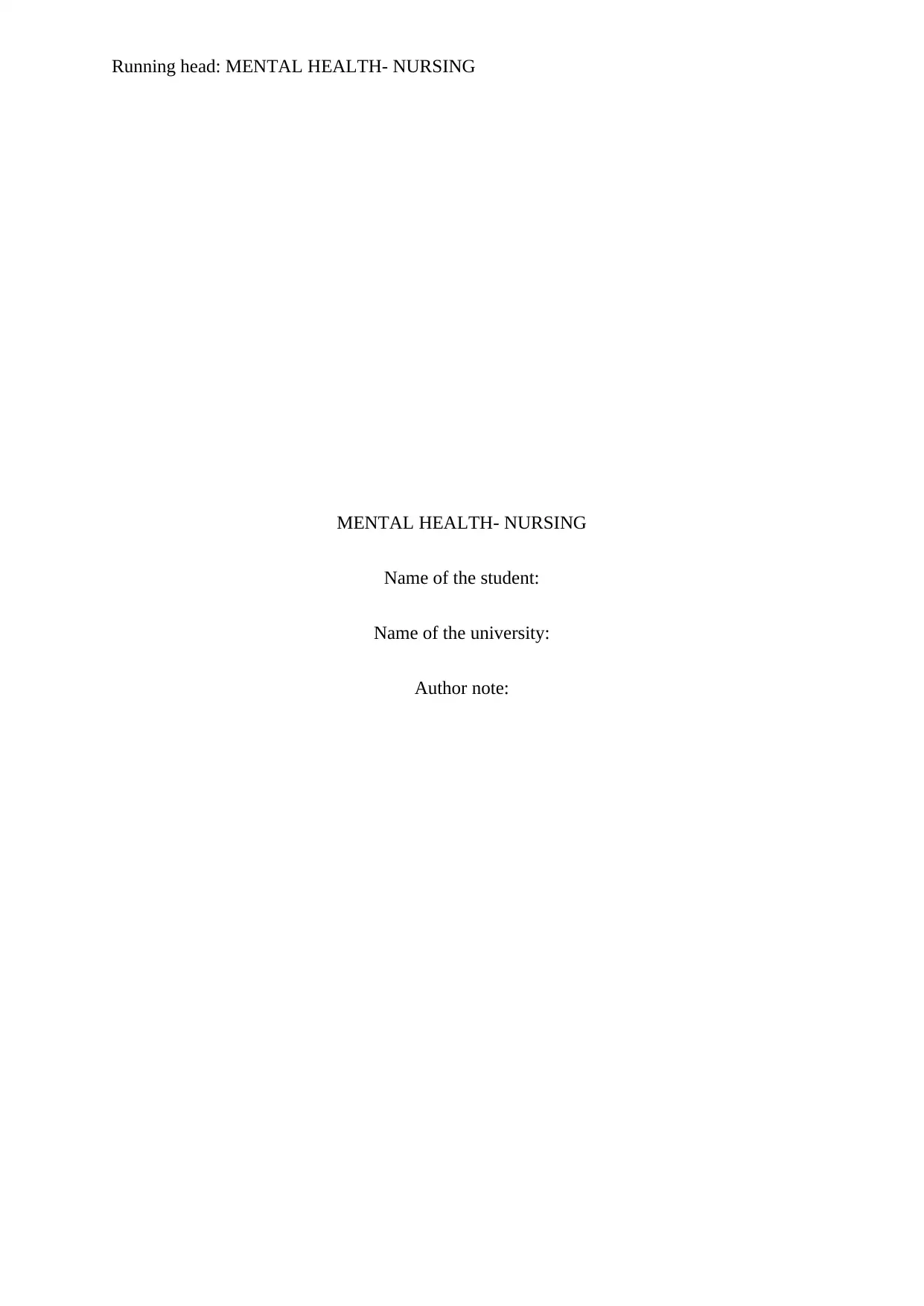
Running head: MENTAL HEALTH- NURSING
MENTAL HEALTH- NURSING
Name of the student:
Name of the university:
Author note:
MENTAL HEALTH- NURSING
Name of the student:
Name of the university:
Author note:
Paraphrase This Document
Need a fresh take? Get an instant paraphrase of this document with our AI Paraphraser
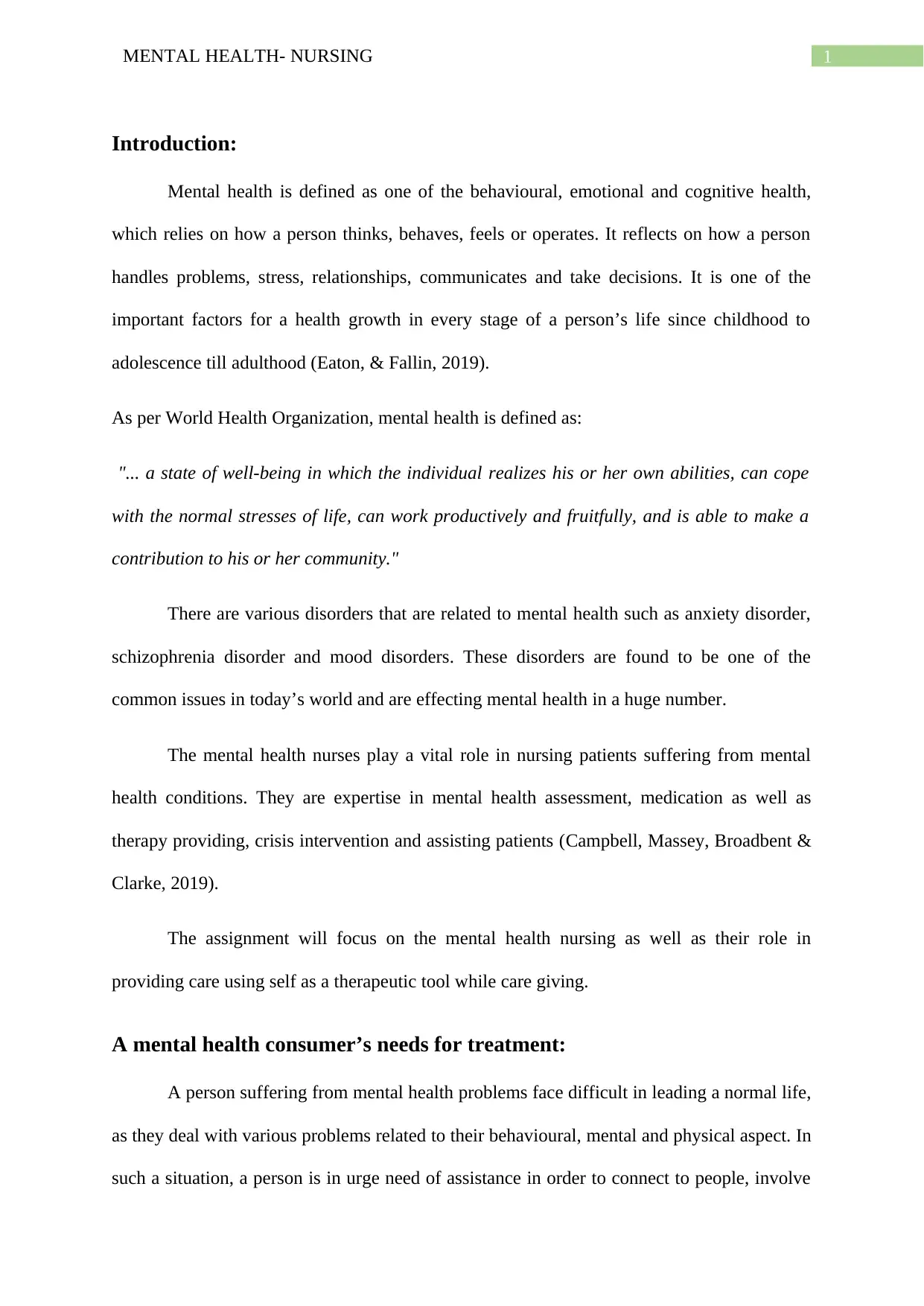
1MENTAL HEALTH- NURSING
Introduction:
Mental health is defined as one of the behavioural, emotional and cognitive health,
which relies on how a person thinks, behaves, feels or operates. It reflects on how a person
handles problems, stress, relationships, communicates and take decisions. It is one of the
important factors for a health growth in every stage of a person’s life since childhood to
adolescence till adulthood (Eaton, & Fallin, 2019).
As per World Health Organization, mental health is defined as:
"... a state of well-being in which the individual realizes his or her own abilities, can cope
with the normal stresses of life, can work productively and fruitfully, and is able to make a
contribution to his or her community."
There are various disorders that are related to mental health such as anxiety disorder,
schizophrenia disorder and mood disorders. These disorders are found to be one of the
common issues in today’s world and are effecting mental health in a huge number.
The mental health nurses play a vital role in nursing patients suffering from mental
health conditions. They are expertise in mental health assessment, medication as well as
therapy providing, crisis intervention and assisting patients (Campbell, Massey, Broadbent &
Clarke, 2019).
The assignment will focus on the mental health nursing as well as their role in
providing care using self as a therapeutic tool while care giving.
A mental health consumer’s needs for treatment:
A person suffering from mental health problems face difficult in leading a normal life,
as they deal with various problems related to their behavioural, mental and physical aspect. In
such a situation, a person is in urge need of assistance in order to connect to people, involve
Introduction:
Mental health is defined as one of the behavioural, emotional and cognitive health,
which relies on how a person thinks, behaves, feels or operates. It reflects on how a person
handles problems, stress, relationships, communicates and take decisions. It is one of the
important factors for a health growth in every stage of a person’s life since childhood to
adolescence till adulthood (Eaton, & Fallin, 2019).
As per World Health Organization, mental health is defined as:
"... a state of well-being in which the individual realizes his or her own abilities, can cope
with the normal stresses of life, can work productively and fruitfully, and is able to make a
contribution to his or her community."
There are various disorders that are related to mental health such as anxiety disorder,
schizophrenia disorder and mood disorders. These disorders are found to be one of the
common issues in today’s world and are effecting mental health in a huge number.
The mental health nurses play a vital role in nursing patients suffering from mental
health conditions. They are expertise in mental health assessment, medication as well as
therapy providing, crisis intervention and assisting patients (Campbell, Massey, Broadbent &
Clarke, 2019).
The assignment will focus on the mental health nursing as well as their role in
providing care using self as a therapeutic tool while care giving.
A mental health consumer’s needs for treatment:
A person suffering from mental health problems face difficult in leading a normal life,
as they deal with various problems related to their behavioural, mental and physical aspect. In
such a situation, a person is in urge need of assistance in order to connect to people, involve
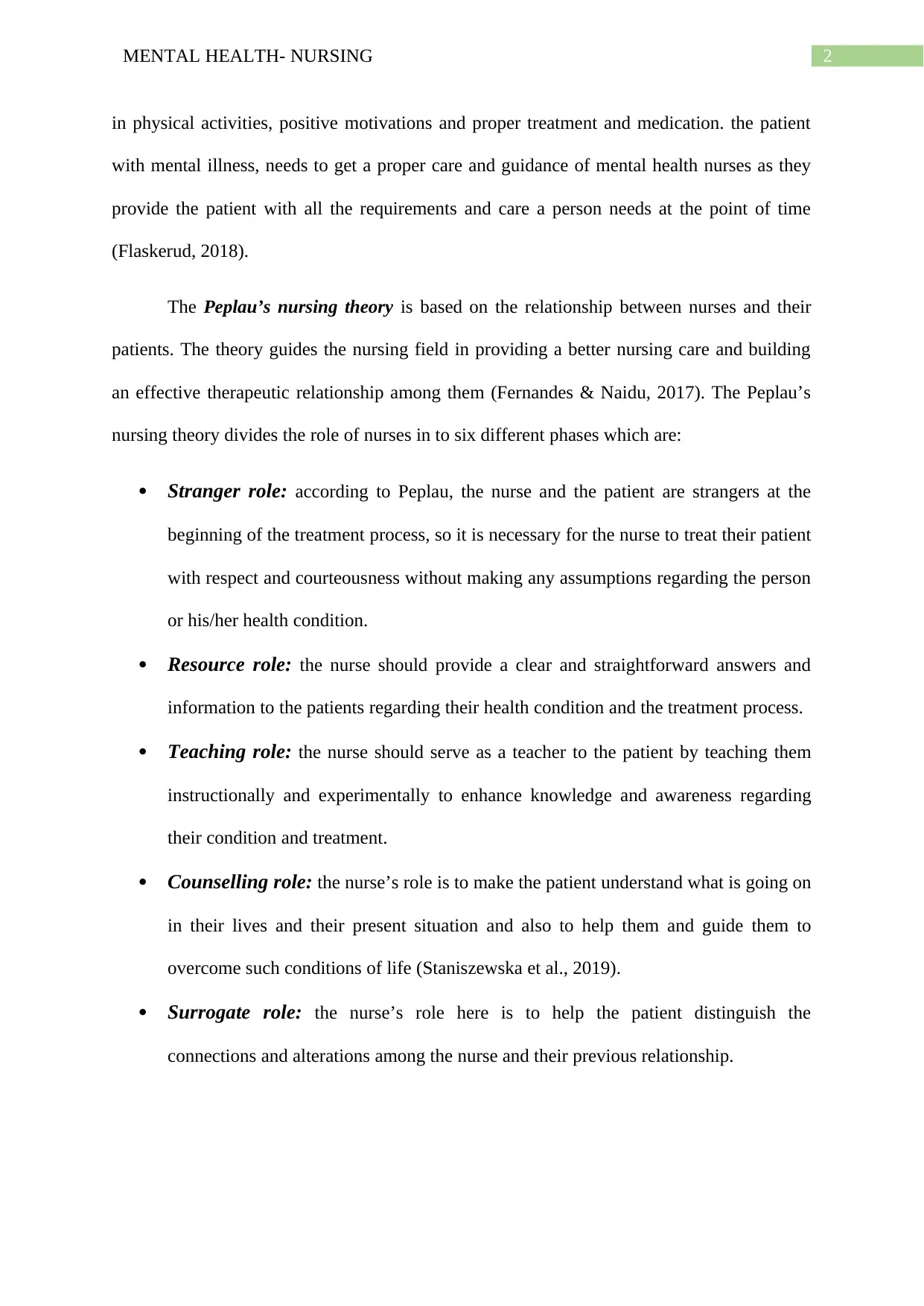
2MENTAL HEALTH- NURSING
in physical activities, positive motivations and proper treatment and medication. the patient
with mental illness, needs to get a proper care and guidance of mental health nurses as they
provide the patient with all the requirements and care a person needs at the point of time
(Flaskerud, 2018).
The Peplau’s nursing theory is based on the relationship between nurses and their
patients. The theory guides the nursing field in providing a better nursing care and building
an effective therapeutic relationship among them (Fernandes & Naidu, 2017). The Peplau’s
nursing theory divides the role of nurses in to six different phases which are:
Stranger role: according to Peplau, the nurse and the patient are strangers at the
beginning of the treatment process, so it is necessary for the nurse to treat their patient
with respect and courteousness without making any assumptions regarding the person
or his/her health condition.
Resource role: the nurse should provide a clear and straightforward answers and
information to the patients regarding their health condition and the treatment process.
Teaching role: the nurse should serve as a teacher to the patient by teaching them
instructionally and experimentally to enhance knowledge and awareness regarding
their condition and treatment.
Counselling role: the nurse’s role is to make the patient understand what is going on
in their lives and their present situation and also to help them and guide them to
overcome such conditions of life (Staniszewska et al., 2019).
Surrogate role: the nurse’s role here is to help the patient distinguish the
connections and alterations among the nurse and their previous relationship.
in physical activities, positive motivations and proper treatment and medication. the patient
with mental illness, needs to get a proper care and guidance of mental health nurses as they
provide the patient with all the requirements and care a person needs at the point of time
(Flaskerud, 2018).
The Peplau’s nursing theory is based on the relationship between nurses and their
patients. The theory guides the nursing field in providing a better nursing care and building
an effective therapeutic relationship among them (Fernandes & Naidu, 2017). The Peplau’s
nursing theory divides the role of nurses in to six different phases which are:
Stranger role: according to Peplau, the nurse and the patient are strangers at the
beginning of the treatment process, so it is necessary for the nurse to treat their patient
with respect and courteousness without making any assumptions regarding the person
or his/her health condition.
Resource role: the nurse should provide a clear and straightforward answers and
information to the patients regarding their health condition and the treatment process.
Teaching role: the nurse should serve as a teacher to the patient by teaching them
instructionally and experimentally to enhance knowledge and awareness regarding
their condition and treatment.
Counselling role: the nurse’s role is to make the patient understand what is going on
in their lives and their present situation and also to help them and guide them to
overcome such conditions of life (Staniszewska et al., 2019).
Surrogate role: the nurse’s role here is to help the patient distinguish the
connections and alterations among the nurse and their previous relationship.
⊘ This is a preview!⊘
Do you want full access?
Subscribe today to unlock all pages.

Trusted by 1+ million students worldwide
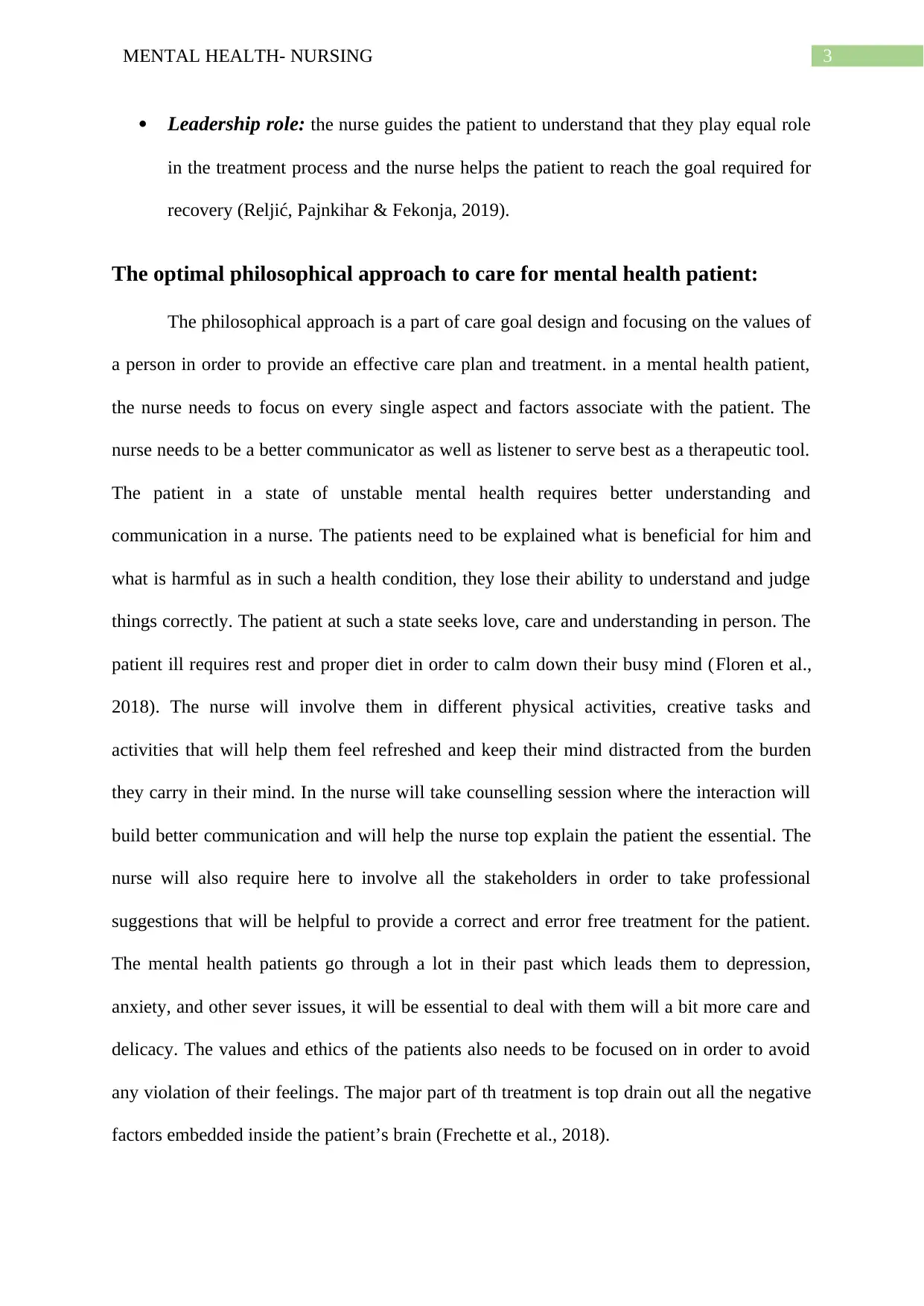
3MENTAL HEALTH- NURSING
Leadership role: the nurse guides the patient to understand that they play equal role
in the treatment process and the nurse helps the patient to reach the goal required for
recovery (Reljić, Pajnkihar & Fekonja, 2019).
The optimal philosophical approach to care for mental health patient:
The philosophical approach is a part of care goal design and focusing on the values of
a person in order to provide an effective care plan and treatment. in a mental health patient,
the nurse needs to focus on every single aspect and factors associate with the patient. The
nurse needs to be a better communicator as well as listener to serve best as a therapeutic tool.
The patient in a state of unstable mental health requires better understanding and
communication in a nurse. The patients need to be explained what is beneficial for him and
what is harmful as in such a health condition, they lose their ability to understand and judge
things correctly. The patient at such a state seeks love, care and understanding in person. The
patient ill requires rest and proper diet in order to calm down their busy mind (Floren et al.,
2018). The nurse will involve them in different physical activities, creative tasks and
activities that will help them feel refreshed and keep their mind distracted from the burden
they carry in their mind. In the nurse will take counselling session where the interaction will
build better communication and will help the nurse top explain the patient the essential. The
nurse will also require here to involve all the stakeholders in order to take professional
suggestions that will be helpful to provide a correct and error free treatment for the patient.
The mental health patients go through a lot in their past which leads them to depression,
anxiety, and other sever issues, it will be essential to deal with them will a bit more care and
delicacy. The values and ethics of the patients also needs to be focused on in order to avoid
any violation of their feelings. The major part of th treatment is top drain out all the negative
factors embedded inside the patient’s brain (Frechette et al., 2018).
Leadership role: the nurse guides the patient to understand that they play equal role
in the treatment process and the nurse helps the patient to reach the goal required for
recovery (Reljić, Pajnkihar & Fekonja, 2019).
The optimal philosophical approach to care for mental health patient:
The philosophical approach is a part of care goal design and focusing on the values of
a person in order to provide an effective care plan and treatment. in a mental health patient,
the nurse needs to focus on every single aspect and factors associate with the patient. The
nurse needs to be a better communicator as well as listener to serve best as a therapeutic tool.
The patient in a state of unstable mental health requires better understanding and
communication in a nurse. The patients need to be explained what is beneficial for him and
what is harmful as in such a health condition, they lose their ability to understand and judge
things correctly. The patient at such a state seeks love, care and understanding in person. The
patient ill requires rest and proper diet in order to calm down their busy mind (Floren et al.,
2018). The nurse will involve them in different physical activities, creative tasks and
activities that will help them feel refreshed and keep their mind distracted from the burden
they carry in their mind. In the nurse will take counselling session where the interaction will
build better communication and will help the nurse top explain the patient the essential. The
nurse will also require here to involve all the stakeholders in order to take professional
suggestions that will be helpful to provide a correct and error free treatment for the patient.
The mental health patients go through a lot in their past which leads them to depression,
anxiety, and other sever issues, it will be essential to deal with them will a bit more care and
delicacy. The values and ethics of the patients also needs to be focused on in order to avoid
any violation of their feelings. The major part of th treatment is top drain out all the negative
factors embedded inside the patient’s brain (Frechette et al., 2018).
Paraphrase This Document
Need a fresh take? Get an instant paraphrase of this document with our AI Paraphraser
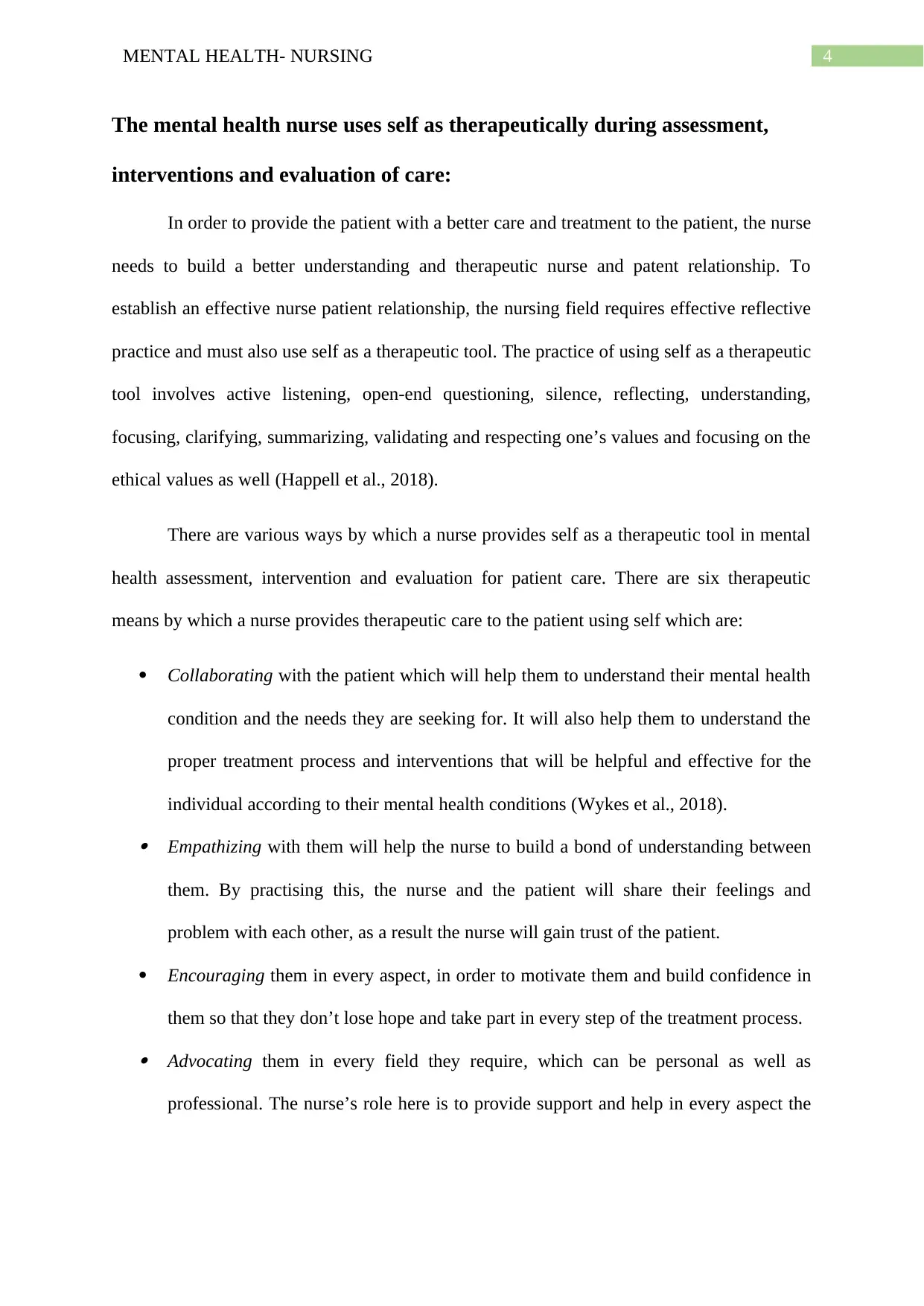
4MENTAL HEALTH- NURSING
The mental health nurse uses self as therapeutically during assessment,
interventions and evaluation of care:
In order to provide the patient with a better care and treatment to the patient, the nurse
needs to build a better understanding and therapeutic nurse and patent relationship. To
establish an effective nurse patient relationship, the nursing field requires effective reflective
practice and must also use self as a therapeutic tool. The practice of using self as a therapeutic
tool involves active listening, open-end questioning, silence, reflecting, understanding,
focusing, clarifying, summarizing, validating and respecting one’s values and focusing on the
ethical values as well (Happell et al., 2018).
There are various ways by which a nurse provides self as a therapeutic tool in mental
health assessment, intervention and evaluation for patient care. There are six therapeutic
means by which a nurse provides therapeutic care to the patient using self which are:
Collaborating with the patient which will help them to understand their mental health
condition and the needs they are seeking for. It will also help them to understand the
proper treatment process and interventions that will be helpful and effective for the
individual according to their mental health conditions (Wykes et al., 2018). Empathizing with them will help the nurse to build a bond of understanding between
them. By practising this, the nurse and the patient will share their feelings and
problem with each other, as a result the nurse will gain trust of the patient.
Encouraging them in every aspect, in order to motivate them and build confidence in
them so that they don’t lose hope and take part in every step of the treatment process. Advocating them in every field they require, which can be personal as well as
professional. The nurse’s role here is to provide support and help in every aspect the
The mental health nurse uses self as therapeutically during assessment,
interventions and evaluation of care:
In order to provide the patient with a better care and treatment to the patient, the nurse
needs to build a better understanding and therapeutic nurse and patent relationship. To
establish an effective nurse patient relationship, the nursing field requires effective reflective
practice and must also use self as a therapeutic tool. The practice of using self as a therapeutic
tool involves active listening, open-end questioning, silence, reflecting, understanding,
focusing, clarifying, summarizing, validating and respecting one’s values and focusing on the
ethical values as well (Happell et al., 2018).
There are various ways by which a nurse provides self as a therapeutic tool in mental
health assessment, intervention and evaluation for patient care. There are six therapeutic
means by which a nurse provides therapeutic care to the patient using self which are:
Collaborating with the patient which will help them to understand their mental health
condition and the needs they are seeking for. It will also help them to understand the
proper treatment process and interventions that will be helpful and effective for the
individual according to their mental health conditions (Wykes et al., 2018). Empathizing with them will help the nurse to build a bond of understanding between
them. By practising this, the nurse and the patient will share their feelings and
problem with each other, as a result the nurse will gain trust of the patient.
Encouraging them in every aspect, in order to motivate them and build confidence in
them so that they don’t lose hope and take part in every step of the treatment process. Advocating them in every field they require, which can be personal as well as
professional. The nurse’s role here is to provide support and help in every aspect the
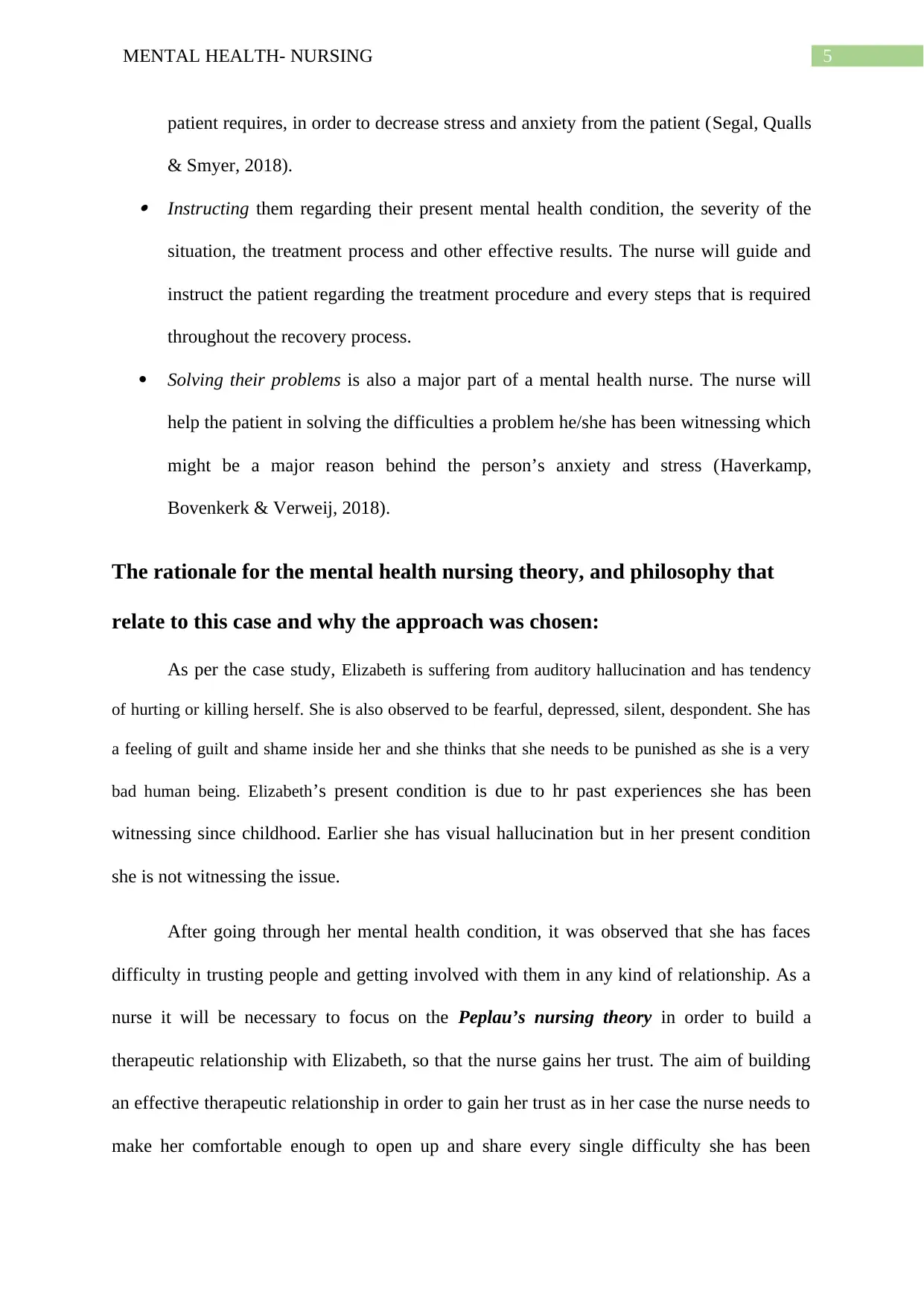
5MENTAL HEALTH- NURSING
patient requires, in order to decrease stress and anxiety from the patient (Segal, Qualls
& Smyer, 2018). Instructing them regarding their present mental health condition, the severity of the
situation, the treatment process and other effective results. The nurse will guide and
instruct the patient regarding the treatment procedure and every steps that is required
throughout the recovery process.
Solving their problems is also a major part of a mental health nurse. The nurse will
help the patient in solving the difficulties a problem he/she has been witnessing which
might be a major reason behind the person’s anxiety and stress (Haverkamp,
Bovenkerk & Verweij, 2018).
The rationale for the mental health nursing theory, and philosophy that
relate to this case and why the approach was chosen:
As per the case study, Elizabeth is suffering from auditory hallucination and has tendency
of hurting or killing herself. She is also observed to be fearful, depressed, silent, despondent. She has
a feeling of guilt and shame inside her and she thinks that she needs to be punished as she is a very
bad human being. Elizabeth’s present condition is due to hr past experiences she has been
witnessing since childhood. Earlier she has visual hallucination but in her present condition
she is not witnessing the issue.
After going through her mental health condition, it was observed that she has faces
difficulty in trusting people and getting involved with them in any kind of relationship. As a
nurse it will be necessary to focus on the Peplau’s nursing theory in order to build a
therapeutic relationship with Elizabeth, so that the nurse gains her trust. The aim of building
an effective therapeutic relationship in order to gain her trust as in her case the nurse needs to
make her comfortable enough to open up and share every single difficulty she has been
patient requires, in order to decrease stress and anxiety from the patient (Segal, Qualls
& Smyer, 2018). Instructing them regarding their present mental health condition, the severity of the
situation, the treatment process and other effective results. The nurse will guide and
instruct the patient regarding the treatment procedure and every steps that is required
throughout the recovery process.
Solving their problems is also a major part of a mental health nurse. The nurse will
help the patient in solving the difficulties a problem he/she has been witnessing which
might be a major reason behind the person’s anxiety and stress (Haverkamp,
Bovenkerk & Verweij, 2018).
The rationale for the mental health nursing theory, and philosophy that
relate to this case and why the approach was chosen:
As per the case study, Elizabeth is suffering from auditory hallucination and has tendency
of hurting or killing herself. She is also observed to be fearful, depressed, silent, despondent. She has
a feeling of guilt and shame inside her and she thinks that she needs to be punished as she is a very
bad human being. Elizabeth’s present condition is due to hr past experiences she has been
witnessing since childhood. Earlier she has visual hallucination but in her present condition
she is not witnessing the issue.
After going through her mental health condition, it was observed that she has faces
difficulty in trusting people and getting involved with them in any kind of relationship. As a
nurse it will be necessary to focus on the Peplau’s nursing theory in order to build a
therapeutic relationship with Elizabeth, so that the nurse gains her trust. The aim of building
an effective therapeutic relationship in order to gain her trust as in her case the nurse needs to
make her comfortable enough to open up and share every single difficulty she has been
⊘ This is a preview!⊘
Do you want full access?
Subscribe today to unlock all pages.

Trusted by 1+ million students worldwide
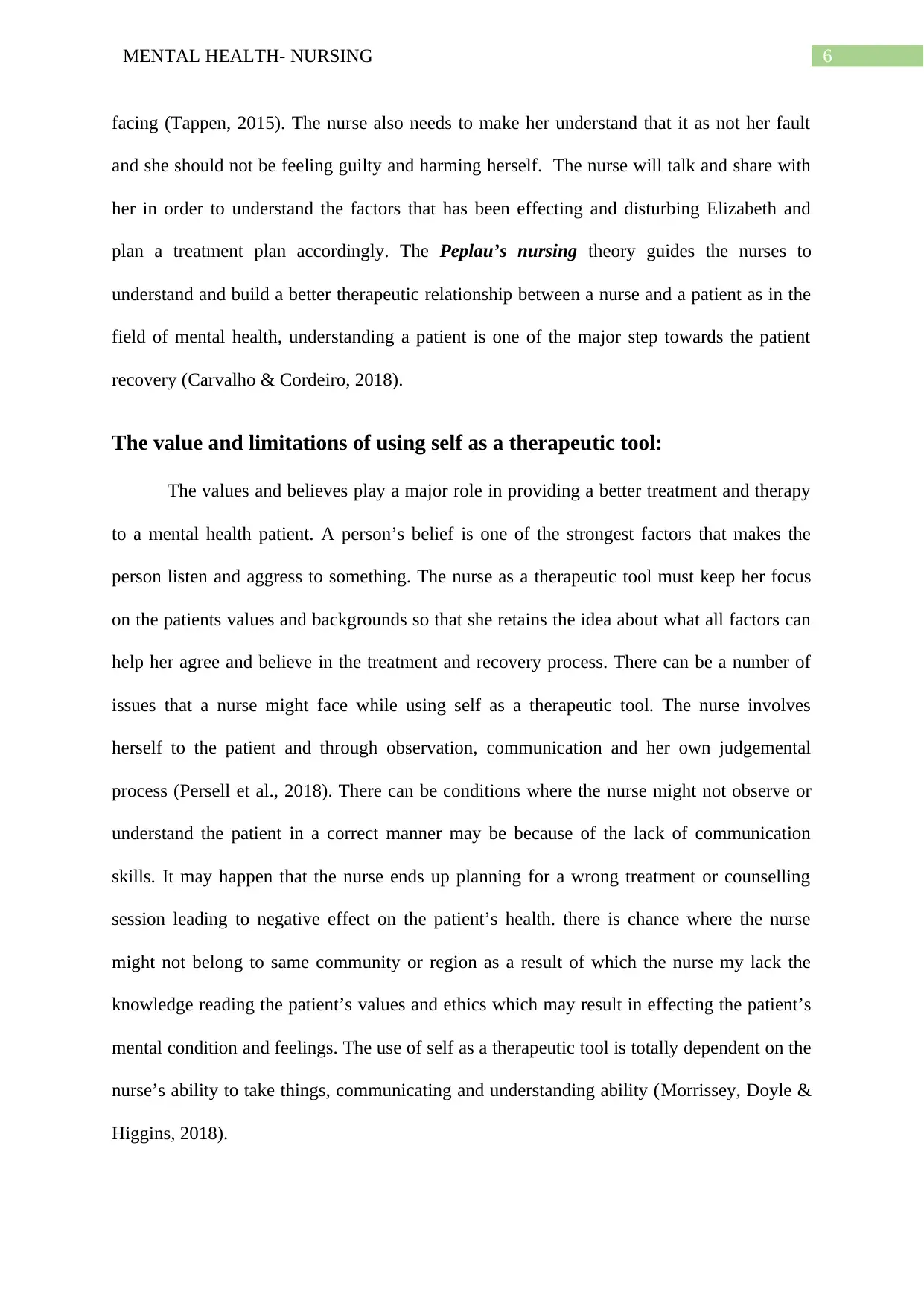
6MENTAL HEALTH- NURSING
facing (Tappen, 2015). The nurse also needs to make her understand that it as not her fault
and she should not be feeling guilty and harming herself. The nurse will talk and share with
her in order to understand the factors that has been effecting and disturbing Elizabeth and
plan a treatment plan accordingly. The Peplau’s nursing theory guides the nurses to
understand and build a better therapeutic relationship between a nurse and a patient as in the
field of mental health, understanding a patient is one of the major step towards the patient
recovery (Carvalho & Cordeiro, 2018).
The value and limitations of using self as a therapeutic tool:
The values and believes play a major role in providing a better treatment and therapy
to a mental health patient. A person’s belief is one of the strongest factors that makes the
person listen and aggress to something. The nurse as a therapeutic tool must keep her focus
on the patients values and backgrounds so that she retains the idea about what all factors can
help her agree and believe in the treatment and recovery process. There can be a number of
issues that a nurse might face while using self as a therapeutic tool. The nurse involves
herself to the patient and through observation, communication and her own judgemental
process (Persell et al., 2018). There can be conditions where the nurse might not observe or
understand the patient in a correct manner may be because of the lack of communication
skills. It may happen that the nurse ends up planning for a wrong treatment or counselling
session leading to negative effect on the patient’s health. there is chance where the nurse
might not belong to same community or region as a result of which the nurse my lack the
knowledge reading the patient’s values and ethics which may result in effecting the patient’s
mental condition and feelings. The use of self as a therapeutic tool is totally dependent on the
nurse’s ability to take things, communicating and understanding ability (Morrissey, Doyle &
Higgins, 2018).
facing (Tappen, 2015). The nurse also needs to make her understand that it as not her fault
and she should not be feeling guilty and harming herself. The nurse will talk and share with
her in order to understand the factors that has been effecting and disturbing Elizabeth and
plan a treatment plan accordingly. The Peplau’s nursing theory guides the nurses to
understand and build a better therapeutic relationship between a nurse and a patient as in the
field of mental health, understanding a patient is one of the major step towards the patient
recovery (Carvalho & Cordeiro, 2018).
The value and limitations of using self as a therapeutic tool:
The values and believes play a major role in providing a better treatment and therapy
to a mental health patient. A person’s belief is one of the strongest factors that makes the
person listen and aggress to something. The nurse as a therapeutic tool must keep her focus
on the patients values and backgrounds so that she retains the idea about what all factors can
help her agree and believe in the treatment and recovery process. There can be a number of
issues that a nurse might face while using self as a therapeutic tool. The nurse involves
herself to the patient and through observation, communication and her own judgemental
process (Persell et al., 2018). There can be conditions where the nurse might not observe or
understand the patient in a correct manner may be because of the lack of communication
skills. It may happen that the nurse ends up planning for a wrong treatment or counselling
session leading to negative effect on the patient’s health. there is chance where the nurse
might not belong to same community or region as a result of which the nurse my lack the
knowledge reading the patient’s values and ethics which may result in effecting the patient’s
mental condition and feelings. The use of self as a therapeutic tool is totally dependent on the
nurse’s ability to take things, communicating and understanding ability (Morrissey, Doyle &
Higgins, 2018).
Paraphrase This Document
Need a fresh take? Get an instant paraphrase of this document with our AI Paraphraser
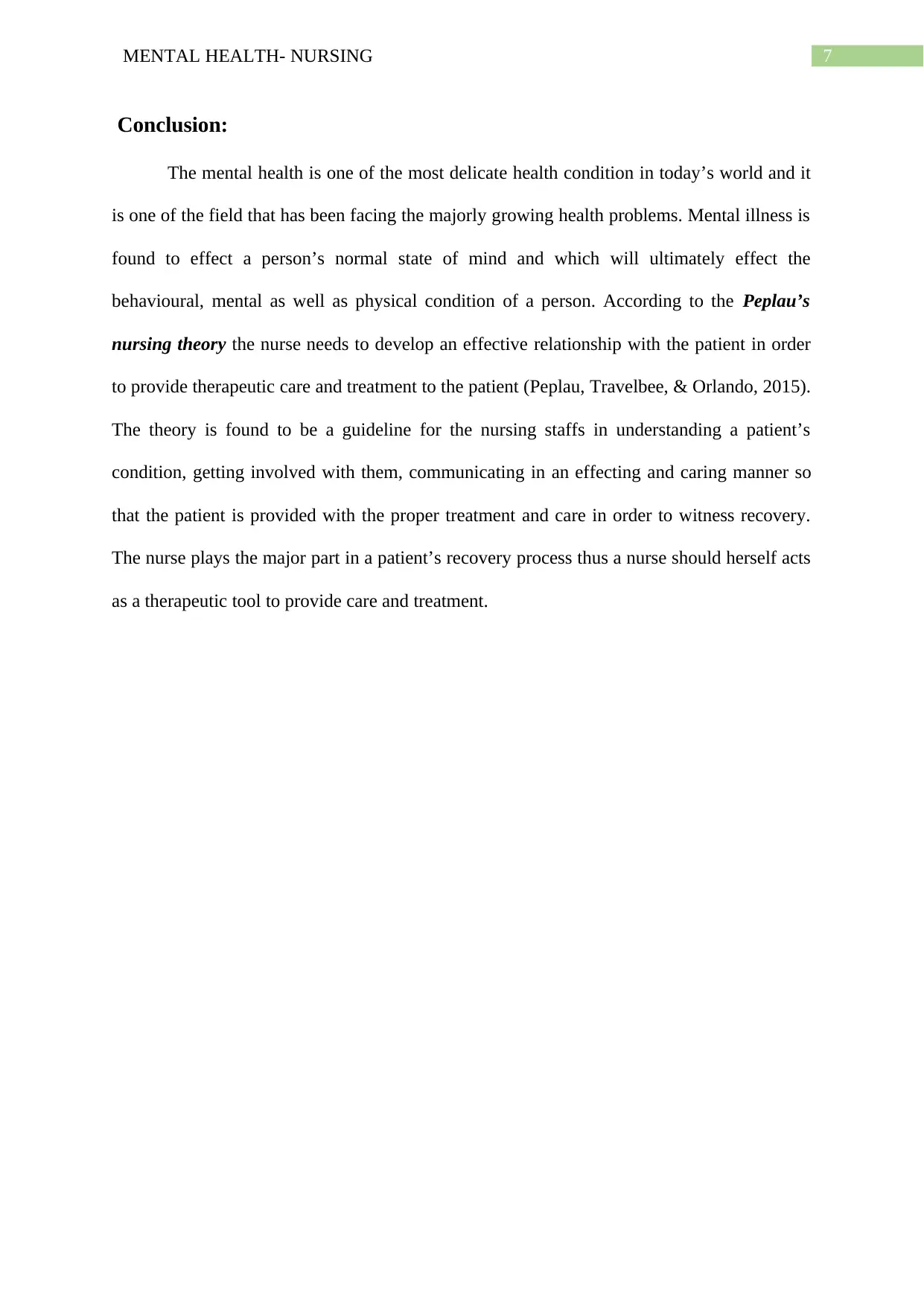
7MENTAL HEALTH- NURSING
Conclusion:
The mental health is one of the most delicate health condition in today’s world and it
is one of the field that has been facing the majorly growing health problems. Mental illness is
found to effect a person’s normal state of mind and which will ultimately effect the
behavioural, mental as well as physical condition of a person. According to the Peplau’s
nursing theory the nurse needs to develop an effective relationship with the patient in order
to provide therapeutic care and treatment to the patient (Peplau, Travelbee, & Orlando, 2015).
The theory is found to be a guideline for the nursing staffs in understanding a patient’s
condition, getting involved with them, communicating in an effecting and caring manner so
that the patient is provided with the proper treatment and care in order to witness recovery.
The nurse plays the major part in a patient’s recovery process thus a nurse should herself acts
as a therapeutic tool to provide care and treatment.
Conclusion:
The mental health is one of the most delicate health condition in today’s world and it
is one of the field that has been facing the majorly growing health problems. Mental illness is
found to effect a person’s normal state of mind and which will ultimately effect the
behavioural, mental as well as physical condition of a person. According to the Peplau’s
nursing theory the nurse needs to develop an effective relationship with the patient in order
to provide therapeutic care and treatment to the patient (Peplau, Travelbee, & Orlando, 2015).
The theory is found to be a guideline for the nursing staffs in understanding a patient’s
condition, getting involved with them, communicating in an effecting and caring manner so
that the patient is provided with the proper treatment and care in order to witness recovery.
The nurse plays the major part in a patient’s recovery process thus a nurse should herself acts
as a therapeutic tool to provide care and treatment.
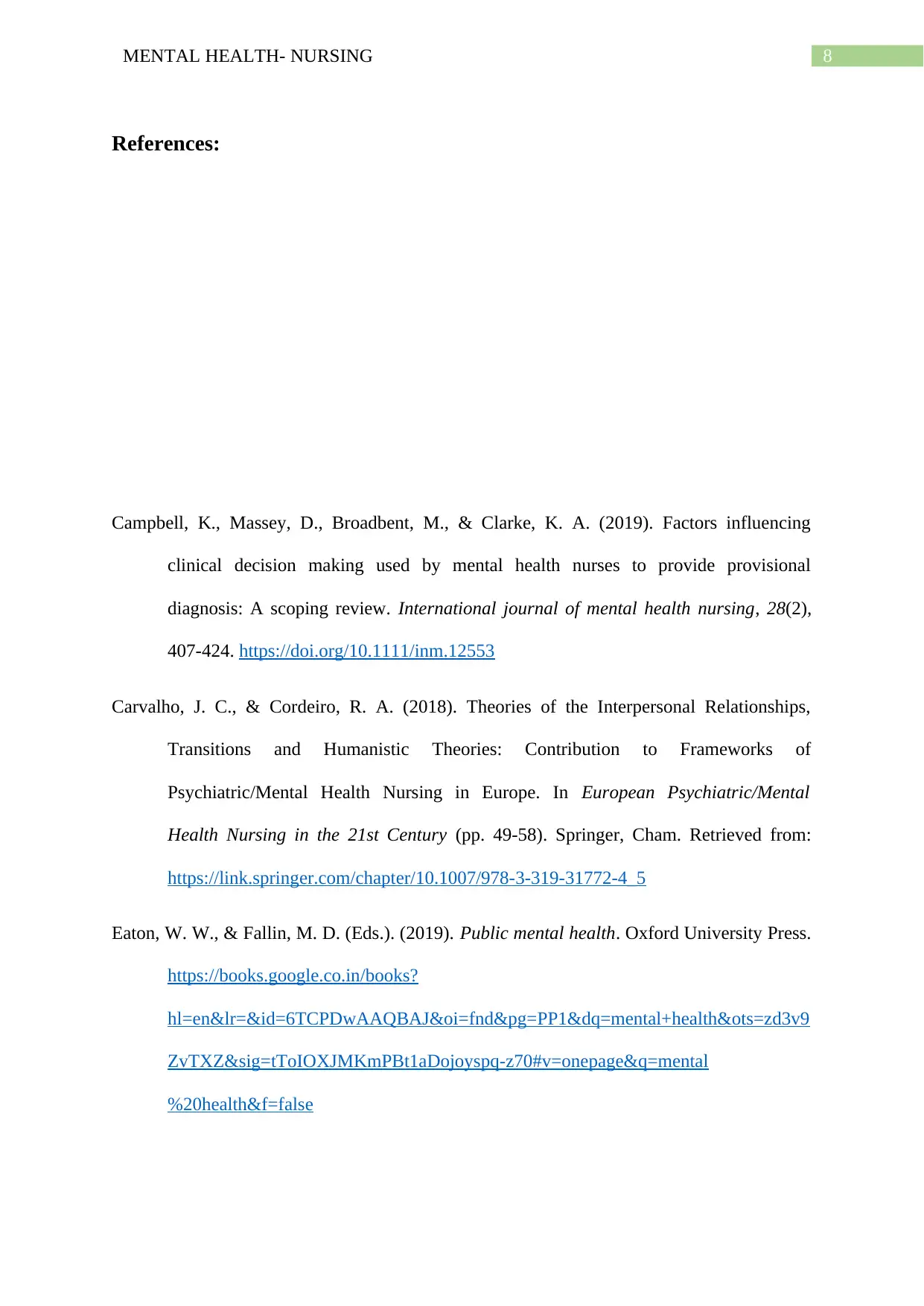
8MENTAL HEALTH- NURSING
References:
Campbell, K., Massey, D., Broadbent, M., & Clarke, K. A. (2019). Factors influencing
clinical decision making used by mental health nurses to provide provisional
diagnosis: A scoping review. International journal of mental health nursing, 28(2),
407-424. https://doi.org/10.1111/inm.12553
Carvalho, J. C., & Cordeiro, R. A. (2018). Theories of the Interpersonal Relationships,
Transitions and Humanistic Theories: Contribution to Frameworks of
Psychiatric/Mental Health Nursing in Europe. In European Psychiatric/Mental
Health Nursing in the 21st Century (pp. 49-58). Springer, Cham. Retrieved from:
https://link.springer.com/chapter/10.1007/978-3-319-31772-4_5
Eaton, W. W., & Fallin, M. D. (Eds.). (2019). Public mental health. Oxford University Press.
https://books.google.co.in/books?
hl=en&lr=&id=6TCPDwAAQBAJ&oi=fnd&pg=PP1&dq=mental+health&ots=zd3v9
ZvTXZ&sig=tToIOXJMKmPBt1aDojoyspq-z70#v=onepage&q=mental
%20health&f=false
References:
Campbell, K., Massey, D., Broadbent, M., & Clarke, K. A. (2019). Factors influencing
clinical decision making used by mental health nurses to provide provisional
diagnosis: A scoping review. International journal of mental health nursing, 28(2),
407-424. https://doi.org/10.1111/inm.12553
Carvalho, J. C., & Cordeiro, R. A. (2018). Theories of the Interpersonal Relationships,
Transitions and Humanistic Theories: Contribution to Frameworks of
Psychiatric/Mental Health Nursing in Europe. In European Psychiatric/Mental
Health Nursing in the 21st Century (pp. 49-58). Springer, Cham. Retrieved from:
https://link.springer.com/chapter/10.1007/978-3-319-31772-4_5
Eaton, W. W., & Fallin, M. D. (Eds.). (2019). Public mental health. Oxford University Press.
https://books.google.co.in/books?
hl=en&lr=&id=6TCPDwAAQBAJ&oi=fnd&pg=PP1&dq=mental+health&ots=zd3v9
ZvTXZ&sig=tToIOXJMKmPBt1aDojoyspq-z70#v=onepage&q=mental
%20health&f=false
⊘ This is a preview!⊘
Do you want full access?
Subscribe today to unlock all pages.

Trusted by 1+ million students worldwide
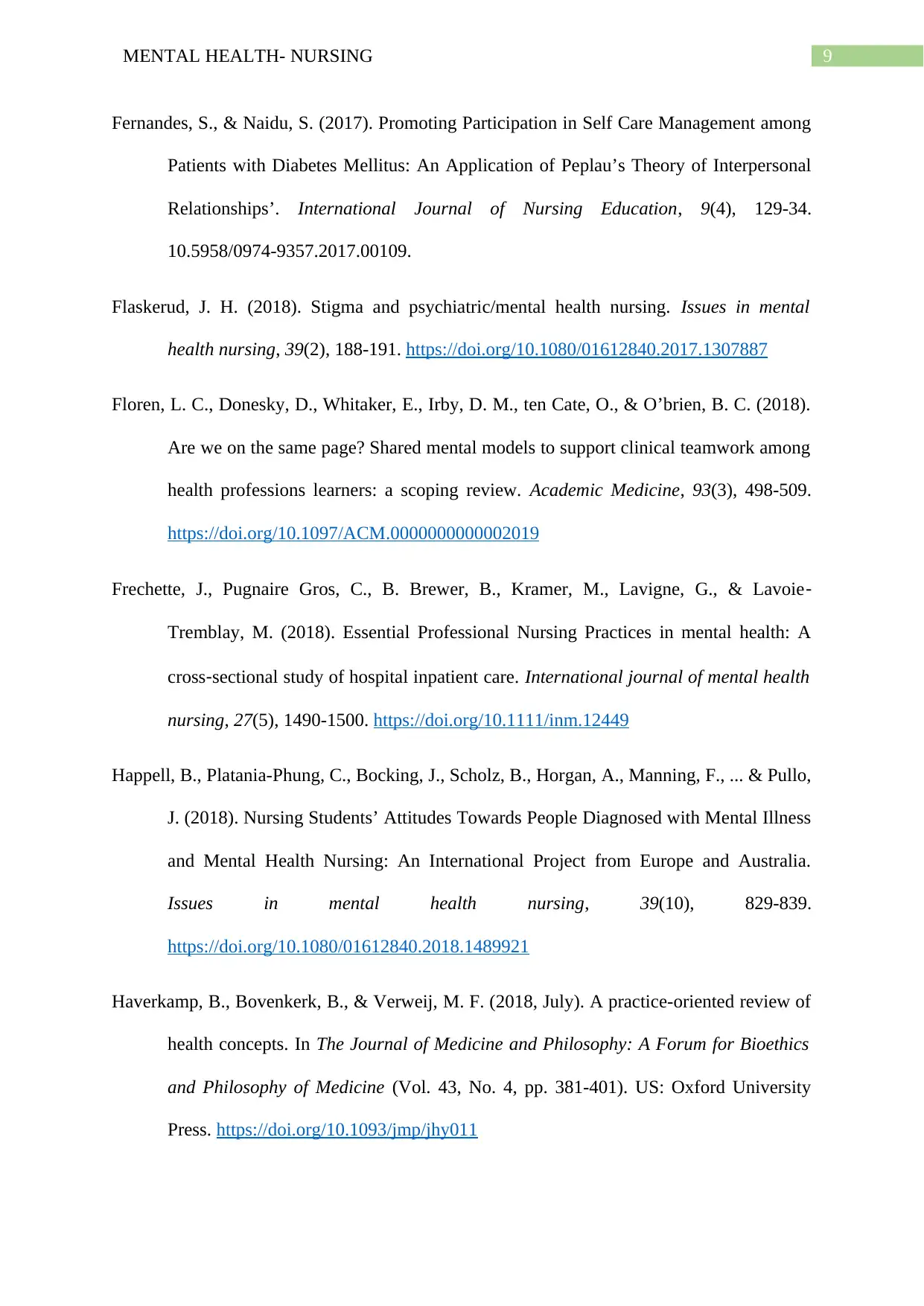
9MENTAL HEALTH- NURSING
Fernandes, S., & Naidu, S. (2017). Promoting Participation in Self Care Management among
Patients with Diabetes Mellitus: An Application of Peplau’s Theory of Interpersonal
Relationships’. International Journal of Nursing Education, 9(4), 129-34.
10.5958/0974-9357.2017.00109.
Flaskerud, J. H. (2018). Stigma and psychiatric/mental health nursing. Issues in mental
health nursing, 39(2), 188-191. https://doi.org/10.1080/01612840.2017.1307887
Floren, L. C., Donesky, D., Whitaker, E., Irby, D. M., ten Cate, O., & O’brien, B. C. (2018).
Are we on the same page? Shared mental models to support clinical teamwork among
health professions learners: a scoping review. Academic Medicine, 93(3), 498-509.
https://doi.org/10.1097/ACM.0000000000002019
Frechette, J., Pugnaire Gros, C., B. Brewer, B., Kramer, M., Lavigne, G., & Lavoie‐
Tremblay, M. (2018). Essential Professional Nursing Practices in mental health: A
cross‐sectional study of hospital inpatient care. International journal of mental health
nursing, 27(5), 1490-1500. https://doi.org/10.1111/inm.12449
Happell, B., Platania-Phung, C., Bocking, J., Scholz, B., Horgan, A., Manning, F., ... & Pullo,
J. (2018). Nursing Students’ Attitudes Towards People Diagnosed with Mental Illness
and Mental Health Nursing: An International Project from Europe and Australia.
Issues in mental health nursing, 39(10), 829-839.
https://doi.org/10.1080/01612840.2018.1489921
Haverkamp, B., Bovenkerk, B., & Verweij, M. F. (2018, July). A practice-oriented review of
health concepts. In The Journal of Medicine and Philosophy: A Forum for Bioethics
and Philosophy of Medicine (Vol. 43, No. 4, pp. 381-401). US: Oxford University
Press. https://doi.org/10.1093/jmp/jhy011
Fernandes, S., & Naidu, S. (2017). Promoting Participation in Self Care Management among
Patients with Diabetes Mellitus: An Application of Peplau’s Theory of Interpersonal
Relationships’. International Journal of Nursing Education, 9(4), 129-34.
10.5958/0974-9357.2017.00109.
Flaskerud, J. H. (2018). Stigma and psychiatric/mental health nursing. Issues in mental
health nursing, 39(2), 188-191. https://doi.org/10.1080/01612840.2017.1307887
Floren, L. C., Donesky, D., Whitaker, E., Irby, D. M., ten Cate, O., & O’brien, B. C. (2018).
Are we on the same page? Shared mental models to support clinical teamwork among
health professions learners: a scoping review. Academic Medicine, 93(3), 498-509.
https://doi.org/10.1097/ACM.0000000000002019
Frechette, J., Pugnaire Gros, C., B. Brewer, B., Kramer, M., Lavigne, G., & Lavoie‐
Tremblay, M. (2018). Essential Professional Nursing Practices in mental health: A
cross‐sectional study of hospital inpatient care. International journal of mental health
nursing, 27(5), 1490-1500. https://doi.org/10.1111/inm.12449
Happell, B., Platania-Phung, C., Bocking, J., Scholz, B., Horgan, A., Manning, F., ... & Pullo,
J. (2018). Nursing Students’ Attitudes Towards People Diagnosed with Mental Illness
and Mental Health Nursing: An International Project from Europe and Australia.
Issues in mental health nursing, 39(10), 829-839.
https://doi.org/10.1080/01612840.2018.1489921
Haverkamp, B., Bovenkerk, B., & Verweij, M. F. (2018, July). A practice-oriented review of
health concepts. In The Journal of Medicine and Philosophy: A Forum for Bioethics
and Philosophy of Medicine (Vol. 43, No. 4, pp. 381-401). US: Oxford University
Press. https://doi.org/10.1093/jmp/jhy011
Paraphrase This Document
Need a fresh take? Get an instant paraphrase of this document with our AI Paraphraser
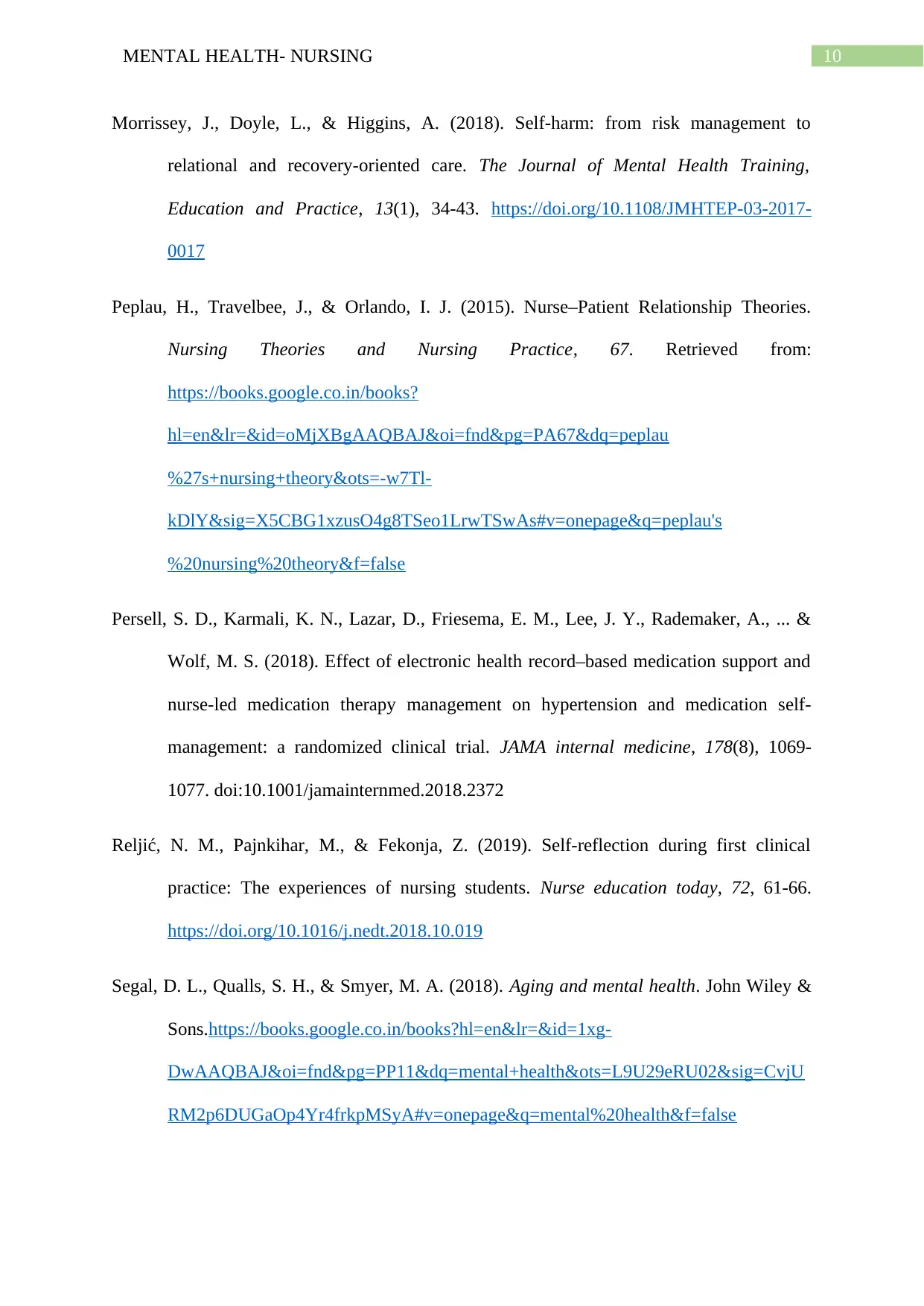
10MENTAL HEALTH- NURSING
Morrissey, J., Doyle, L., & Higgins, A. (2018). Self-harm: from risk management to
relational and recovery-oriented care. The Journal of Mental Health Training,
Education and Practice, 13(1), 34-43. https://doi.org/10.1108/JMHTEP-03-2017-
0017
Peplau, H., Travelbee, J., & Orlando, I. J. (2015). Nurse–Patient Relationship Theories.
Nursing Theories and Nursing Practice, 67. Retrieved from:
https://books.google.co.in/books?
hl=en&lr=&id=oMjXBgAAQBAJ&oi=fnd&pg=PA67&dq=peplau
%27s+nursing+theory&ots=-w7Tl-
kDlY&sig=X5CBG1xzusO4g8TSeo1LrwTSwAs#v=onepage&q=peplau's
%20nursing%20theory&f=false
Persell, S. D., Karmali, K. N., Lazar, D., Friesema, E. M., Lee, J. Y., Rademaker, A., ... &
Wolf, M. S. (2018). Effect of electronic health record–based medication support and
nurse-led medication therapy management on hypertension and medication self-
management: a randomized clinical trial. JAMA internal medicine, 178(8), 1069-
1077. doi:10.1001/jamainternmed.2018.2372
Reljić, N. M., Pajnkihar, M., & Fekonja, Z. (2019). Self-reflection during first clinical
practice: The experiences of nursing students. Nurse education today, 72, 61-66.
https://doi.org/10.1016/j.nedt.2018.10.019
Segal, D. L., Qualls, S. H., & Smyer, M. A. (2018). Aging and mental health. John Wiley &
Sons.https://books.google.co.in/books?hl=en&lr=&id=1xg-
DwAAQBAJ&oi=fnd&pg=PP11&dq=mental+health&ots=L9U29eRU02&sig=CvjU
RM2p6DUGaOp4Yr4frkpMSyA#v=onepage&q=mental%20health&f=false
Morrissey, J., Doyle, L., & Higgins, A. (2018). Self-harm: from risk management to
relational and recovery-oriented care. The Journal of Mental Health Training,
Education and Practice, 13(1), 34-43. https://doi.org/10.1108/JMHTEP-03-2017-
0017
Peplau, H., Travelbee, J., & Orlando, I. J. (2015). Nurse–Patient Relationship Theories.
Nursing Theories and Nursing Practice, 67. Retrieved from:
https://books.google.co.in/books?
hl=en&lr=&id=oMjXBgAAQBAJ&oi=fnd&pg=PA67&dq=peplau
%27s+nursing+theory&ots=-w7Tl-
kDlY&sig=X5CBG1xzusO4g8TSeo1LrwTSwAs#v=onepage&q=peplau's
%20nursing%20theory&f=false
Persell, S. D., Karmali, K. N., Lazar, D., Friesema, E. M., Lee, J. Y., Rademaker, A., ... &
Wolf, M. S. (2018). Effect of electronic health record–based medication support and
nurse-led medication therapy management on hypertension and medication self-
management: a randomized clinical trial. JAMA internal medicine, 178(8), 1069-
1077. doi:10.1001/jamainternmed.2018.2372
Reljić, N. M., Pajnkihar, M., & Fekonja, Z. (2019). Self-reflection during first clinical
practice: The experiences of nursing students. Nurse education today, 72, 61-66.
https://doi.org/10.1016/j.nedt.2018.10.019
Segal, D. L., Qualls, S. H., & Smyer, M. A. (2018). Aging and mental health. John Wiley &
Sons.https://books.google.co.in/books?hl=en&lr=&id=1xg-
DwAAQBAJ&oi=fnd&pg=PP11&dq=mental+health&ots=L9U29eRU02&sig=CvjU
RM2p6DUGaOp4Yr4frkpMSyA#v=onepage&q=mental%20health&f=false
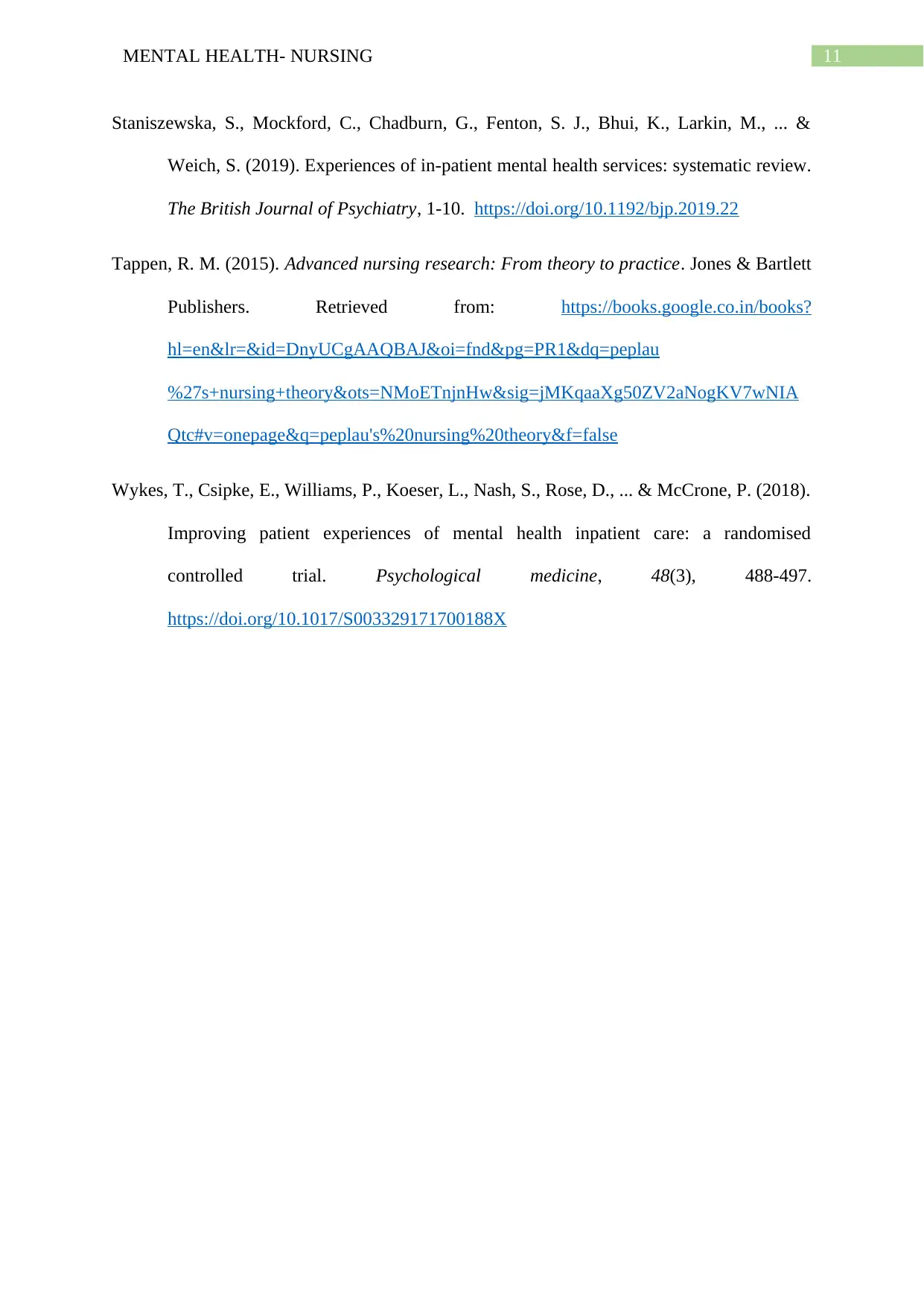
11MENTAL HEALTH- NURSING
Staniszewska, S., Mockford, C., Chadburn, G., Fenton, S. J., Bhui, K., Larkin, M., ... &
Weich, S. (2019). Experiences of in-patient mental health services: systematic review.
The British Journal of Psychiatry, 1-10. https://doi.org/10.1192/bjp.2019.22
Tappen, R. M. (2015). Advanced nursing research: From theory to practice. Jones & Bartlett
Publishers. Retrieved from: https://books.google.co.in/books?
hl=en&lr=&id=DnyUCgAAQBAJ&oi=fnd&pg=PR1&dq=peplau
%27s+nursing+theory&ots=NMoETnjnHw&sig=jMKqaaXg50ZV2aNogKV7wNIA
Qtc#v=onepage&q=peplau's%20nursing%20theory&f=false
Wykes, T., Csipke, E., Williams, P., Koeser, L., Nash, S., Rose, D., ... & McCrone, P. (2018).
Improving patient experiences of mental health inpatient care: a randomised
controlled trial. Psychological medicine, 48(3), 488-497.
https://doi.org/10.1017/S003329171700188X
Staniszewska, S., Mockford, C., Chadburn, G., Fenton, S. J., Bhui, K., Larkin, M., ... &
Weich, S. (2019). Experiences of in-patient mental health services: systematic review.
The British Journal of Psychiatry, 1-10. https://doi.org/10.1192/bjp.2019.22
Tappen, R. M. (2015). Advanced nursing research: From theory to practice. Jones & Bartlett
Publishers. Retrieved from: https://books.google.co.in/books?
hl=en&lr=&id=DnyUCgAAQBAJ&oi=fnd&pg=PR1&dq=peplau
%27s+nursing+theory&ots=NMoETnjnHw&sig=jMKqaaXg50ZV2aNogKV7wNIA
Qtc#v=onepage&q=peplau's%20nursing%20theory&f=false
Wykes, T., Csipke, E., Williams, P., Koeser, L., Nash, S., Rose, D., ... & McCrone, P. (2018).
Improving patient experiences of mental health inpatient care: a randomised
controlled trial. Psychological medicine, 48(3), 488-497.
https://doi.org/10.1017/S003329171700188X
⊘ This is a preview!⊘
Do you want full access?
Subscribe today to unlock all pages.

Trusted by 1+ million students worldwide
1 out of 12
Related Documents
Your All-in-One AI-Powered Toolkit for Academic Success.
+13062052269
info@desklib.com
Available 24*7 on WhatsApp / Email
![[object Object]](/_next/static/media/star-bottom.7253800d.svg)
Unlock your academic potential
Copyright © 2020–2025 A2Z Services. All Rights Reserved. Developed and managed by ZUCOL.





